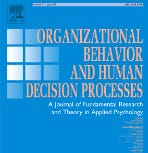New Article in OBHDP: The Fear of “Mission Drift” Gives Female Founders an Edge in Social Venture Fundraising
Gender and social entrepreneurship fundraising: A mission drift perspective
https://www.sciencedirect.com/science/article/pii/S0749597825000196
Yanhua Bird, Junchao (Jason) Li, Yiying Zhu, Zhenyu Liao
Social ventures—businesses that tackle social problems while generating revenue—are on the rise. With 10 million social ventures worldwide, they now employ 200 million people and generate $2 trillion in revenue.
Social entrepreneurs must balance the dual, and sometimes competing, goals of making a profit and making a social impact. As they pursue these goals, some entrepreneurs may prioritize financial gain over social objectives—a phenomenon known as “mission drift.” The risk of mission drift can be a key hurdle in fundraising efforts; funders who are attracted to the social mission of the venture fear that the entrepreneur will abandon their social goals in favor of profit. In short, funders worry, “Will this founder stick to the mission as the business grows?”
This study finds that gender plays a substantial role in how funders judge the risk of mission drift. Across real-world crowdfunding data and two controlled experiments, the authors show that female social entrepreneurs are seen as more committed to their missions and less likely to drift toward profit-only goals. This perception contributes to women consistently raising more funding for social ventures than their male peers. The authors propose, and find, that this advantage can be attributed to the gender stereotype that women have a stronger motivation to be prosocial (i.e., they are driven by a desire to benefit others rather than themselves). In the setting of social ventures, this stereotype becomes an asset, advantaging female founders in fundraising efforts
These findings highlight the impact that concerns about mission drift can have on investment decisions in social ventures. Investors should be aware that these concerns might lead them to make heuristic-driven decisions.
P.S. if you can’t access the full-text let us (m-kouchaki@kellogg.northwestern.edu or mikebaer@asu.edu) know and we’d be happy to share a copy.


